
Have you ever visited a country that feels like the world itself has been condensed into a single point on the map? Imagine arriving in Luxembourg, a small nation tucked between the towering titans of Germany, France, and Belgium. At first glance, it may seem unassuming, a quiet place overshadowed by its larger neighbors. But step onto its cobblestone streets, and you’ll soon realize that Luxembourg is not just small. It is dense with culture, history, and an unexpected richness that unfolds in layers.
A walk through the capital, is like hearing a symphony of languages. Luxembourgish, French, German, English and many more, all blending seamlessly in the air. Here, conversations drift effortlessly from one tongue to another, as if language barriers never existed. The architecture, too, is a reflection of this fusion: medieval fortresses stand proudly beside elegant French-inspired facades, while modern glass towers rise in contrast, symbols of a nation deeply rooted in tradition yet ever-evolving.
But Luxembourg is more than just a meeting point of cultures; it is a place where history whispers from the walls of ancient castles, where deep valleys and lush forests hide trails that feel untouched by time. A place where life moves at a gentle pace, yet carries the weight of centuries.
It is a country of paradoxes. Small yet powerful, quiet yet cosmopolitan, familiar yet always surprising. And as you stand on a bridge overlooking the deep gorge that cuts through the city, watching the golden glow of sunset reflect on its stone walls, you begin to understand: Luxembourg may be small in size, but in spirit, it is boundless.
Let’s go on to a linguistic tour of it!
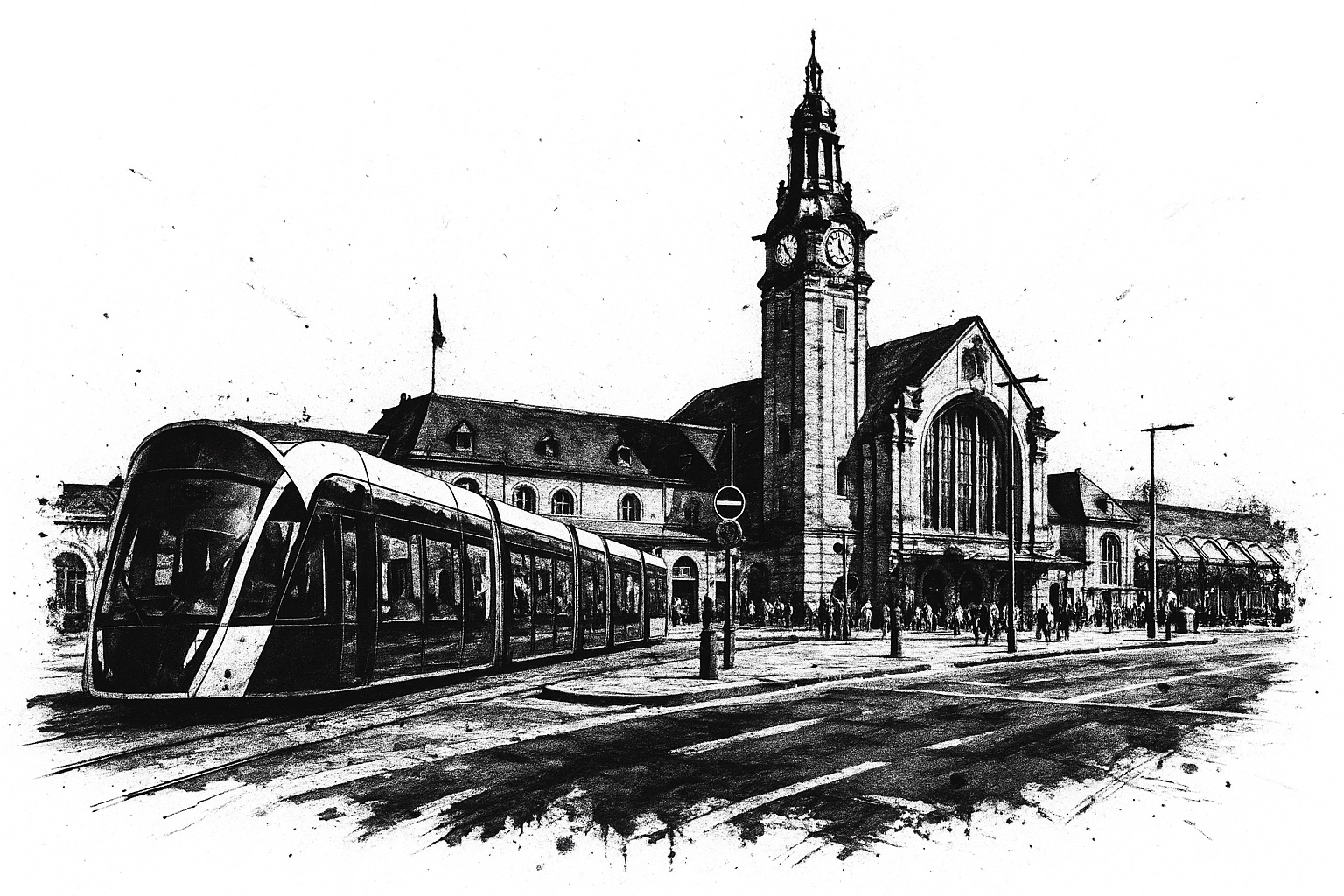
Imagine arrived in Luxembourg, standing in a crowded Tram on an early morning toward the city center, pressed between strangers, the city slowly waking as the sun rises over the rooftops. The scent of fresh coffee lingers in the air, carried from commuters clutching takeaway cups, their breath still heavy with sleep. Outside the window, the golden morning light spills over the old buildings, painting the damp streets in soft hues of amber and grey.
Two Spanish friends sit next to you, their conversation weaving between laughter and intensity, their words quick, sharp, and full of life. Spanish does not whisper, instead it calls out, it sings, it demands to be heard. Spanish moves with rhythm. It is a language that dances, like a tango or a flamenco, each syllable rolling off the tongue with effortless warmth, each phrase carrying the weight of emotion. Even the simplest of exchanges feels like poetry, not because of embellishment, but because the heart speaks first, and the mind follows. It is not a language of hesitation but rather bold, fluid and unafraid. It embraces contradiction, jumps from past to future, from deep philosophy to casual humor in a single breath. It holds history and revolution, love and longing, fire and music. It is not merely a way to communicate but rather a way to feel life fully, without restraint, without fear.
You notice the scent of spices thick in the air as a man stands next to you, speaking to someone on the phone. His words unfurling like silk. Arabic is not spoken, it is woven, carefully, deliberately, with reverence for the weight each word carries. Unlike Spanish, which leaps forward, Arabic is a river that flows both toward the future and back into the past. It is a language where time lingers, where ideas are wrapped in poetry, where silence is as meaningful as speech. Its letters curve like the dunes of the desert, its words echo with centuries of wisdom, faith, and longing. There is no rush in Arabic, no carelessness. It is a language where the sacred and the everyday connect seamlessly, where to speak is to honor both meaning and melody. To an outsider, it may seem intricate, even elusive. But to those who listen, Arabic is not just a language—it is an invitation into a world where words are art, where speech is a bridge between earth and the divine.
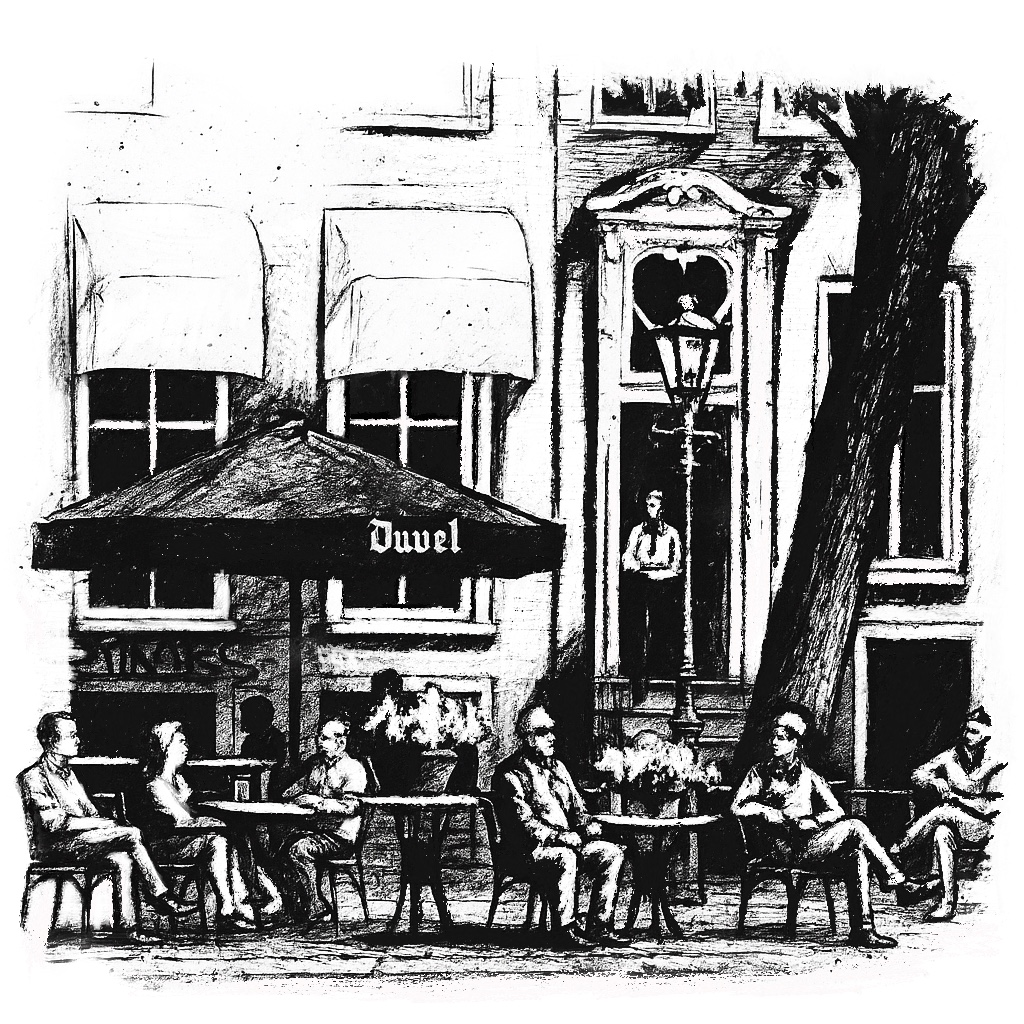
Arrived in the city center, there’s a certain magic to sitting in a café in this little country on a quiet morning, sipping coffee as the sun casts its golden light over the old buildings. In a country with so many linguistic layers, understanding multiple languages, which is by the way an unremarkable skill in Luxembourg, yet a rare gift elsewhere, can be an unexpectedly enlightening experience.
There are two French people sitting at a tiny round table, deep in discussion, not hurried, not forced, but flowing like a gentle stream. Their sentences unfold with an effortless rhythm, rising and falling in a way that feels more like music than mere speech. French carries its speakers like a river carries a boat, it is smooth, fluid, alive. Ideas do not simply exist, they unfold, wrapped in elegant phrasing and careful turns of expression. It doesn’t matter whether they are discussing philosophy, politics, or love, there is an entire art to the way real French is spoken, that you instantly fall in love with it, even if people are simply insulting you.
There is also a group of English people enjoying their tea. The sound of their voices layering over each other like a living symphony of dialects and expressions. English does not carry its speakers, it runs with them, adapts to them, moves at their pace. A language of trade, of science, of poetry, it bends and shifts, pulling from the tongues of a hundred cultures, unafraid of contradiction, unafraid of reinvention. Their conversation is darting from topic to topic. English is not methodical, it is nimble, jumping between logic and humor, between clarity and metaphor, between old traditions and new slang. Even if it often sounds arrogant, it is a language of possibility, a tool that can be bent and reshaped, sometimes losing precision but gaining freedom in return.
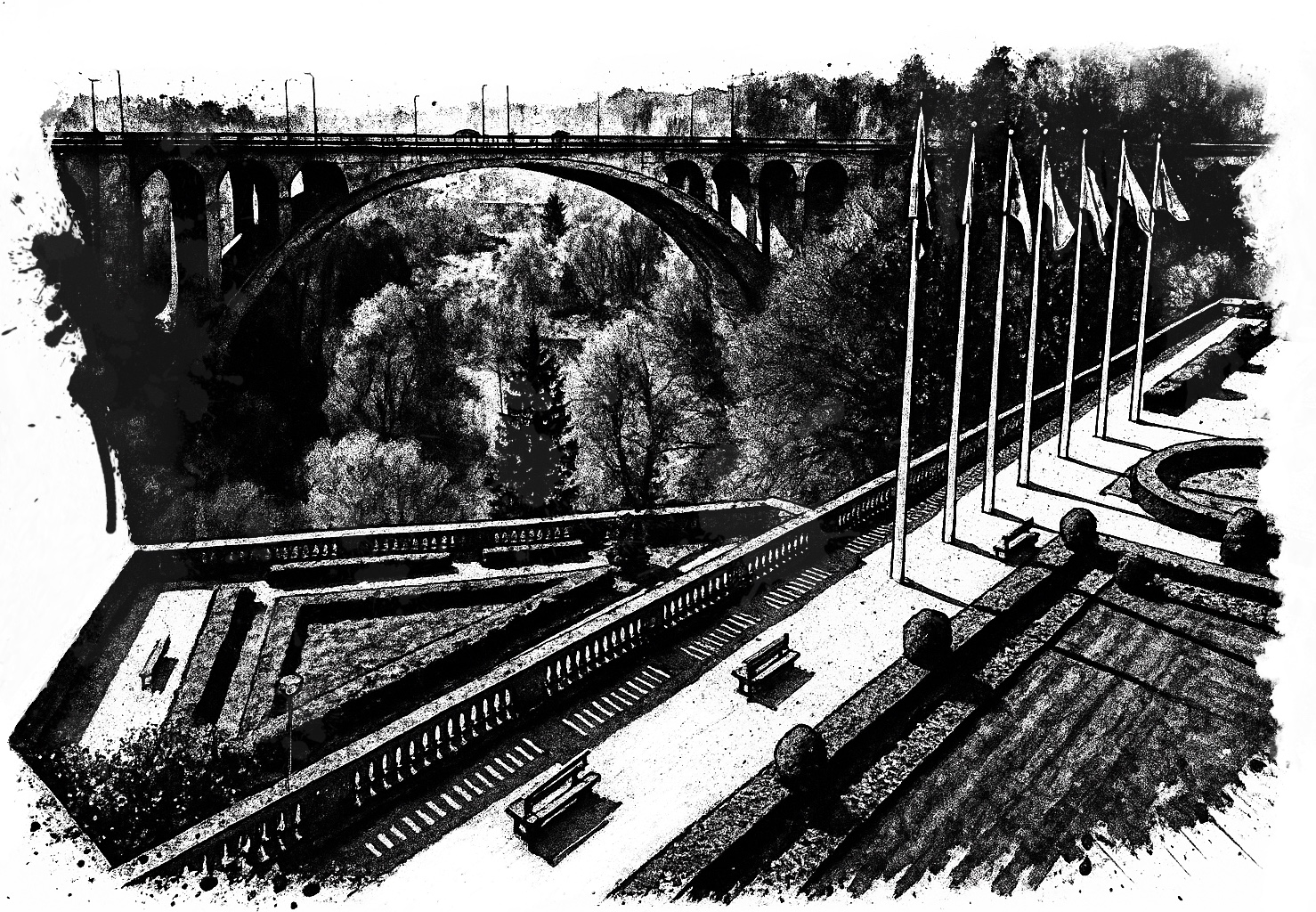
Later that day, your journey brings you on a wooden bench, in a quiet park on a lazy afternoon, the soft rustling of leaves whispering in the breeze. The golden sunlight filters through the branches, casting playful shadows on the cobblestone path. In the distance, the faint laughter of children drifts through the air, mingling with the gentle chirping of birds. A cool breeze carries the scent of freshly cut grass and blooming flowers, wrapping the moment in a sense of calm. As you watch the world move at its own unhurried pace, time feels softer here, measured not in hours, but in the quiet beauty of the present.
There is a couple from Japan sitting on another wooden bench next to you, enjoying this serene moment with their children. A conversation unfolds between two of them, their words measured, deliberate. In Japanese, what is not said carries as much meaning as what is spoken. A language which moves with awareness of space, of respect, of harmony. It does not rush to fill silence. It allows thoughts to breathe. A single sentence can say everything or nothing at all, depending on the pauses, the tone, the context. Words are chosen carefully, sometimes wrapped in layers of politeness, sometimes stripped to their core. To an outsider, it may seem indirect, elusive. But within it lies a deep wisdom: language is not only about transmitting thoughts, but about understanding emotions, relationships, and the moment itself.
In the distance, a small group of Russian people are deep in conversation. Not rushed, not loud, but heavy with meaning. In Russian, a language which seems cold to those who not understand, speech is deliberate, each word carrying the weight of history, philosophy, and an almost existential awareness of life itself. It is a language of certainty, where words land like stones on a frozen river, solid and unyielding. There is no excess, no unnecessary embellishment. What is said is meant. And yet, beneath this raw directness, there is a depth of emotion that few languages can rival. Russian carries within it the weight of Dostoevsky’s despair, Tolstoy’s grandeur, Tchaikovsky’s sorrow. It is a language where poetry and suffering, resilience and beauty exist side by side. The harsh consonants and deep vowels reflect a people shaped by long winters, by revolutions, by an understanding that life is not always kind, but it is always profound. To speak and understand Russian is to understand that words are not just for communication, but they are weapons, bridges, prayers, and poems all at once. A language of hard truths and hidden tenderness, as vast and enigmatic as the land it belongs to.
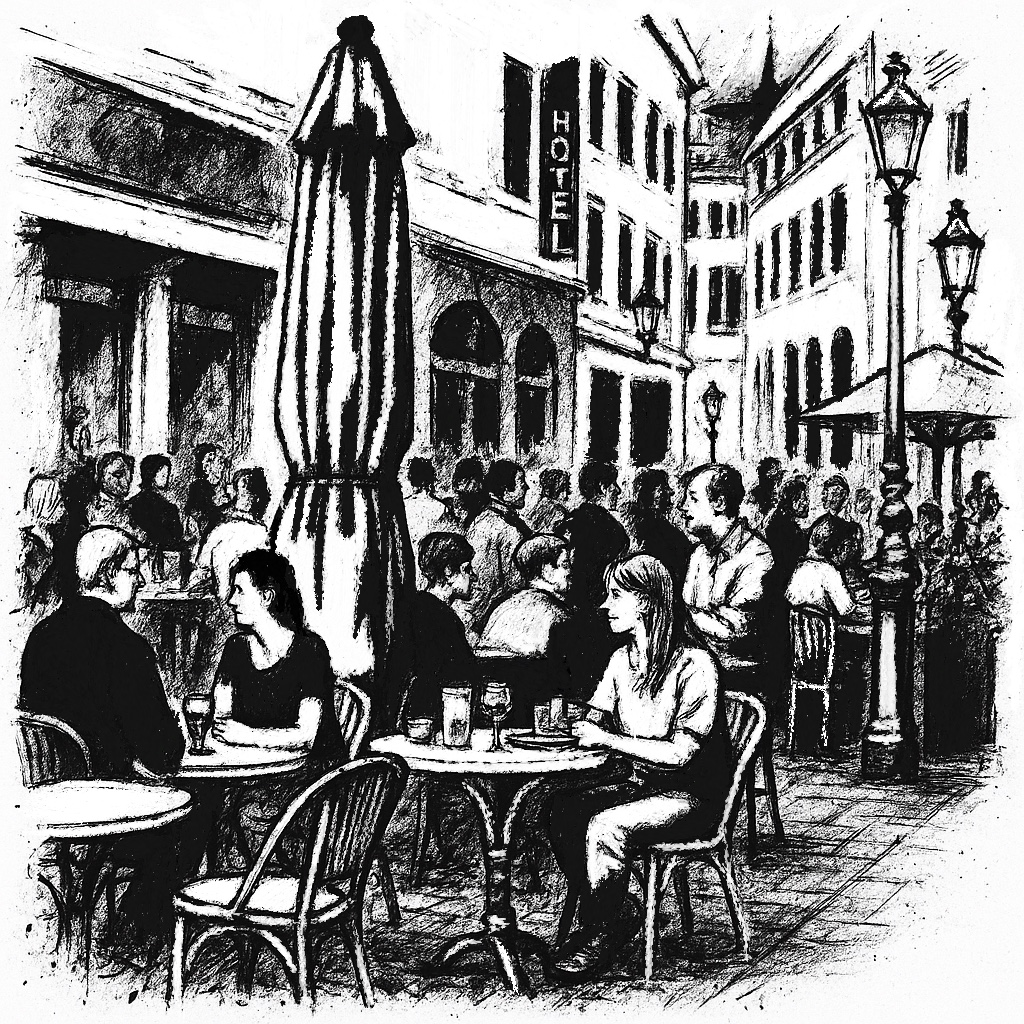
Later on, sitting on the terrace of a restaurant in the evening, a glass of red wine in your hand, as you wait for your dinner to arrive. The warm, golden light of the setting sun spills between the old Luxembourgish buildings, painting the sky in soft hues of pink and blue. A quiet moment, rich with anticipation, where time seems to slow, allowing you to savor the beauty unfolding before you.
Across the terrace, two Italians are in conversation, not just speaking, but performing. Their hands carve shapes in the air, punctuating their words with movement as if the language itself is too alive to be contained in speech alone. Voices rise and fall like waves, passionate, rhythmic, musical. Italian does not simply convey ideas, but it sings them. Every word, every phrase, has a certain cadence, a theatricality, a sense of urgency and emotion. Even the most mundane exchange sounds like poetry, like an aria from an opera. It is a language of expression over precision, where meaning is not always found in what is said, but in how it is said.
Some old friends sit on a bench nearby, their conversation rolling like the tide, soft, melancholic and warm. In Portuguese, words do not rush. They glide, stretching into the air like long shadows at sunset. This is a language woven with saudade, an untranslatable word that captures a deep, almost poetic longing—nostalgia, love, loss, and hope all tangled together. Portuguese is not just spoken, it is felt, carried in the chest, breathed out in sighs and melodies.
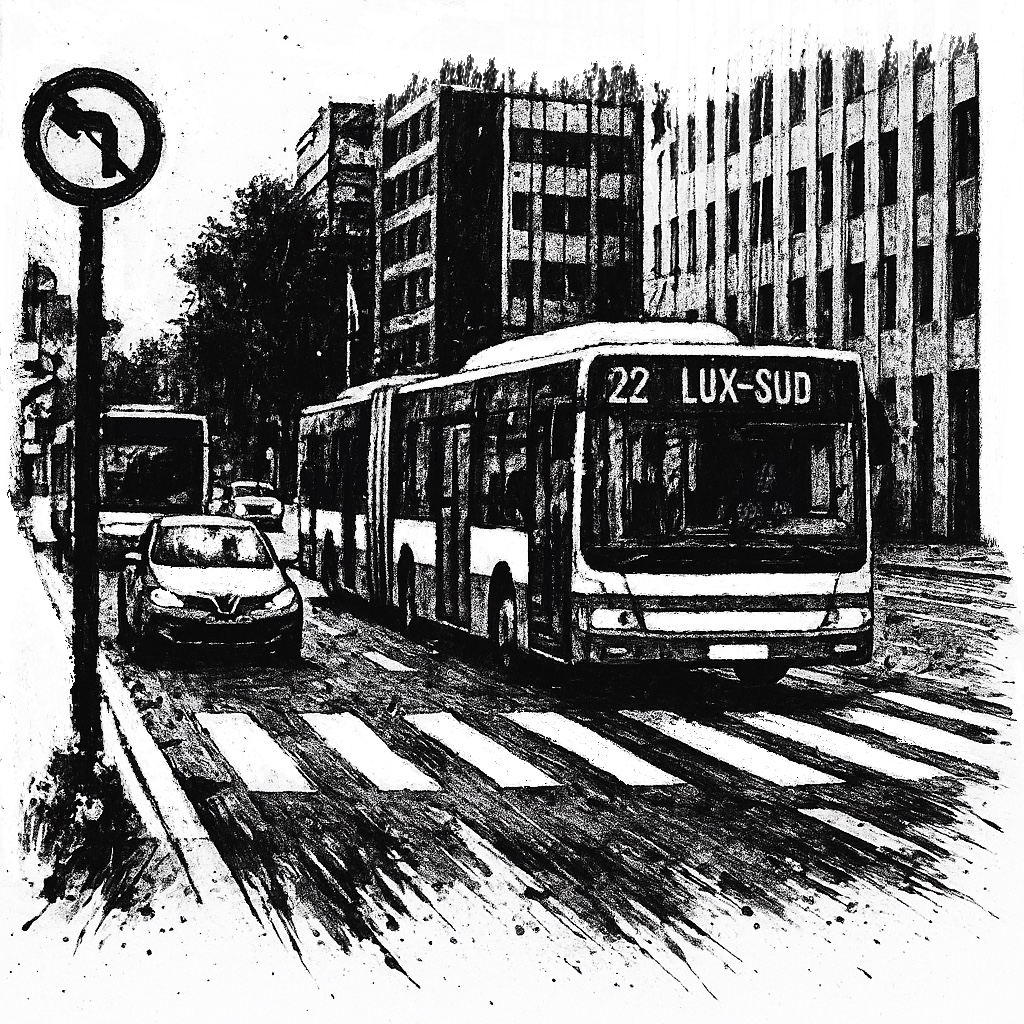
While Time has passed, and you’re now sitting in the dim glow of a nearly empty bus, the city outside is slipping past in streaks of light and shadow. The soft hum of the engine fills the quiet, punctuated only by the occasional sigh of the doors opening at a stop where no one gets on. The streets of Luxembourg, now hushed under the weight of the late night, reflect in the window beside you, blending your own tired gaze with the passing world. The air inside is warm, a gentle contrast to the crisp night outside, where the streetlights cast long, lonely pools of gold on the pavement. There’s a strange comfort in this solitude, in the steady rhythm of the ride, as if time itself has slowed just for you, letting the night stretch endlessly before you like an unspoken thought.
You begin the reflect over all those different nations with their own languages you saw in such a short time span in this small but yet beautiful country. You realize, language is not just sound but it explains how we perceive the world. Words should not be mere labels, they should be reflections of reality, guiding how we interact with the things they describe. Some languages preserve the inner logic of their words, ensuring that meaning is immediately clear, while others borrow words, severing them from their original roots and leaving only hollow names behind.

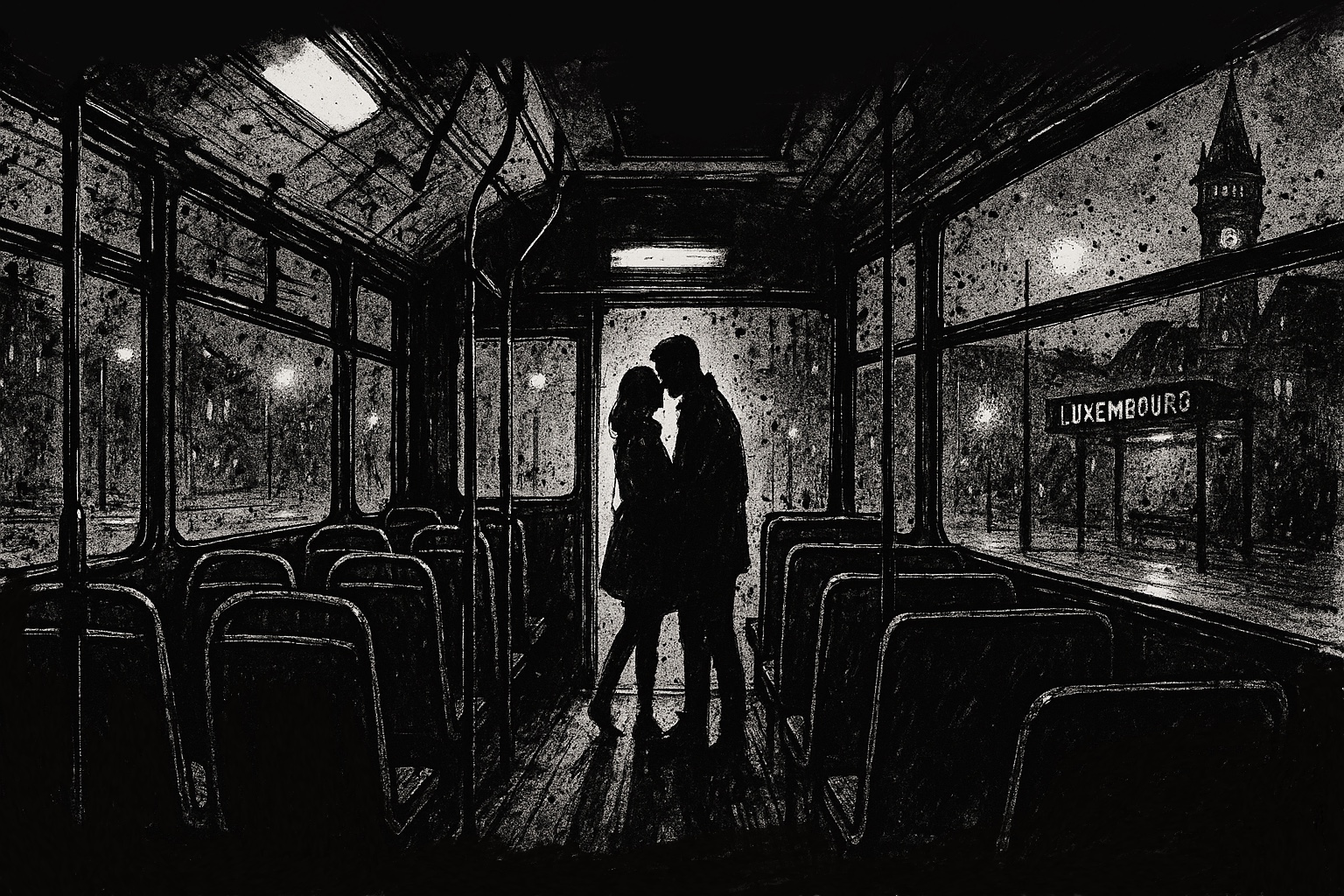
You were surprised when at a station some German people entered the bus at this late hour. Hearing Germans chatting, their conversation dotted with harsh philosophical musings, the language itself shaping and guiding their thoughts. It is as though German was carrying them through each idea methodically, but also leaving room for laughter and reflection between words. A heady mix of discipline and spontaneity, of logical architecture and fleeting human warmth.
You remember that much has been said about German’s so-called harshness. Many criticized its abrupt consonants and rugged syllables. It sounds like they spitting into each one’s face when they are speaking it, that they are insulting each other, arguing or even having a fight. And yet, when you understand what they speak and how they do, when you settle into its rhythm, it feels almost inevitable, like a steady current pulling you forward into deeper waters. If the words sometimes sound forceful, it’s because they carry the weight of centuries of inquiry and exploration.
Kant dissected the structures of human understanding in this language, and Nietzsche upended moral certainties with it. Heidegger peeled back layers of being, while Einstein reshaped our concept of the universe. Each one leaned into German’s ability to hold complex thoughts in sprawling sentences, each clause a new turn down a path of razor-sharp reason. Each word as logical as a blueprint, and each idea laid out without fluff. No wonder so many brilliant minds have thrived within it, turning logic into an art form.
The language itself is a reflection of how Germans approach life: a blend of straightforward honesty and a deep-seated yearning for meaning. Many engineers, mathematicians, and scientists have come from this marvelous country with this outstanding language that seems built for precision, logic and truth. In German, words often mesh together logically like perfectly fitting puzzle pieces, often from smaller parts, neatly slotting together and sometimes with a greater meaning behind.
Things are named for what they do or what they truly are, unlike the more emotional counterpart, latin-based languages, where words seem so fancy and beautiful but sometimes have nothing to do with the meaning, or other languages where words are borrowed because they have no clue of what to name it else. There’s very little pretense in the German language. In a sense, it is unafraid to look at truth in its simplest, most direct form.
Take the word “Regenbogen”. In German, it is a perfect example of how the language constructs meaning with logic and precision. It is built from two words: Regen (rain) and Bogen (arc, or bow). Quite literally, it describes what a rainbow is, an arc formed when it rains. The word itself is an instruction, a definition within its very structure. You don’t need to guess or imagine; the meaning is laid out for you, piece by piece, as naturally as a bridge is built stone by stone.
Now compare this to the Romanian word “curcubeu”. The word is beautiful in sound, almost musical, but it offers no inherent explanation of what a rainbow actually is. It does not break the concept into its visual or elemental components, it simply exists as a name, a poetic utterance that one must memorize without insight into its logic. Where German constructs meaning through function and observation, Romanian embraces an abstract, more lyrical approach, where the word itself holds no obvious clue to its essence.
This contrast reveals something deeper about the two languages. German seeks to name things in a way that grounds them in reality, ensuring that even the simplest word carries an internal logic. Romanian, on the other hand, allows words to be independent of their origins, existing more like melodies than blueprints. One is precise, the other evocative. One explains, the other sings.
In German, a glove is called “Handschuh”, which translates literally to “hand shoe”: a shoe for your hand. The logic is unmistakable! just as shoes protect your feet, gloves protect your hands. The word immediately conveys function and purpose with almost childlike clarity. It is as if the language itself ensures that you see the meaning as soon as you hear it.
Now, compare that to the French word “gant”, which comes from Old Frankish but has lost any direct meaning within its structure. Or take glove in English, which comes from Old Norse (glofi) but similarly gives you no real clue about its purpose or form. If you didn’t already know what a glove was, these words wouldn’t help you figure it out.
But “Handschuh”? Even a child who has never heard the word before but knows the word “Hand” and the other word “Schuh” could guess its meaning instantly. It reflects the engineered precision of German: why create a word that hides meaning when you can construct one that explains itself?
This is German at its best. Language built like a well-assembled machine, where even the simplest words carry logic in their bones.
Take the German word “Werkstatt” and the widely used “garage”.
In German, a “Werkstatt” is more than just a place. It is a function, an action, a process. It is built from two words: Werk (work, craft, creation) and Statt (place). It does not merely tell you that something exists, it tells you what happens there. A Werkstatt is a place of repair, of building, of transformation. Even if you’ve never heard the word before, its meaning reveals itself like a self-contained truth.
Now consider garage, a word borrowed from French (garer, meaning “to shelter” or “to store”). In its original language, the link makes some sense, something placed in a garage is being “stored” or “sheltered.” But when the word was adopted into English, Romanian, and many other languages, its etymological roots faded away. An English speaker using the word garage does not instinctively perceive its deeper meaning, because for them, there is no deeper meaning. It is just a label, a hollow container of a word. A garage could be anything. It does not inherently tell you what it is for.
This disconnection matters. A Werkstatt exists within a world of logic, where names serve as tools of understanding. A garage, however, exists within a world of borrowed sounds, where words are learned by repetition rather than by insight. One language builds from within, ensuring that even a child can grasp meaning intuitively. The other imports from without, leaving its speakers memorizing sounds with no natural bridge to comprehension.
And so, a garage is just a space. A Werkstatt is a purpose. This is the difference between a language that merely names things and a language that ensures you understand them.
But if it ended there, if German was only a tool for logic and science, it might indeed seem austere. What truly makes it extraordinary is the subtle hum of poetry tucked within all that rational precision. Those who say German isn’t beautiful have never heard a grandmother’s lullaby in a sleepy Bavarian village, or listened to a whispered confession of love by candlelight. Beneath the strict grammar rules and the methodical word-building, there is a pulse, a reminder that logic and emotion are not opposites but partners in how we experience the world.
And yet, in a poem, these pieces of language become brushstrokes in a painting of the human soul. Rilke’s verses, for instance, sweep you into a realm of spiritual longing and raw vulnerability, words that evoke both the immensity of the divine and the tight coil of the heart. There’s a unique interplay between the language’s capacity for breathtaking clarity and its willingness to expose our most hidden depths. In that tension, German finds its poetry: never burying itself in ornamentation, but never shying away from the tender or transcendent either.
So yes, German can sound like a challenge at first, like unyielding stone. But stone can be carved, sculpted into forms that endure for ages, forms that stand testament to the complexities of our world and the mysteries of our hearts. Within each supposed harshness, there’s the potential for art. German is not simply about sounding stern or commanding. It’s about unveiling the essence of things with fearless clarity. It’s about the union of reason and resonance, mind and emotion, delivering truth straight from the page to the soul. No wonder that so many great minds come from this country!
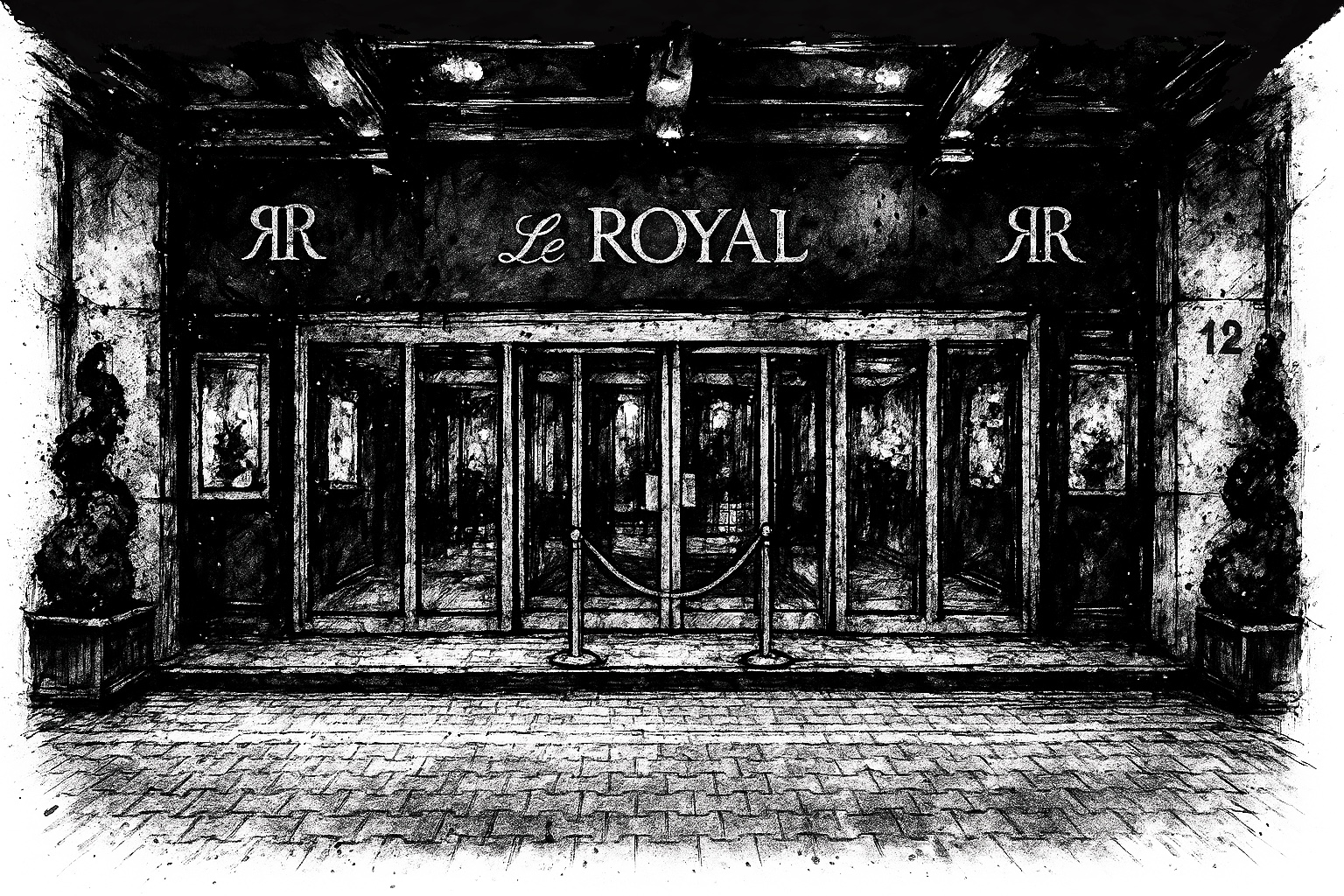
As the bus slows to a stop near your hotel, you step out into the crisp night air, while the city already sleeps. The sudden quiet feels almost surreal after the dense hum of voices and their different languages. The doors hiss shut behind you, and as the bus pulls away, you take a deep breath, letting the stillness settle around you.
Walking toward the entrance, You wonder what languages will look like a thousand years from now, while replaying your journey in your mind, the symphony of languages, the effortless way conversations slipped between people. Here you just witness so many different language in its purest form.
Language should never be a wall, never a weapon of exclusion. It should not be a cage trapping words in strict forms or artificial structures. Instead, it should be exactly what it is meant to be: a form of communication to describe life, carrying ideas, emotions, and meaning with it. It should be alive, bending, evolving, connecting.
But one thing is for sure: There are no ugly languages!
As you step into the warmth of the hotel lobby, the receptionist greets you with a friendly “Bonsoir!” and, without hesitation, you respond. Not in the language you think you should speak, but in the one that feels most natural in that moment. Because that’s what language is meant to be, not something we force, but something we live.
“Gudden owend!”


Add your first comment to this post